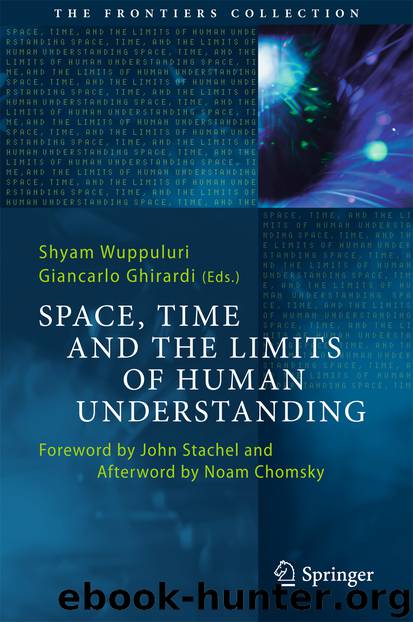Space, Time and the Limits of Human Understanding by Shyam Wuppuluri & Giancarlo Ghirardi

Author:Shyam Wuppuluri & Giancarlo Ghirardi
Language: eng
Format: epub
Publisher: Springer International Publishing, Cham
20.2 Mathematics and the Limits of Human Understanding
Because of our nature, human understanding is finite and limited. After all we are higher primates and our brain capacities although large are necessarily finite and limited. Consequently, so is our knowledge and understanding. We inhabit the Earth, which is but a tiny speck in an unbelievably vast universe. Beyond this vastness, modern science postulates infinitely many parallel universes existing alongside our own, which remains the only one we can know anything about. That part of the universe that we can observe is tiny, and the time span we experience is so very short, even acknowledging that the light that reaches us from distant galaxies was emitted millions of years ago.
From a theistic position, what we poor finite creatures can come to know in an infinite universe created by an infinitely complex god is necessarily miniscule and subject to all the errors of our limited and fallible being. Even if god has created a universe of regularities and patterns we can never be sure we have uncovered them with our bounded, finite knowing.
From an atheistic perspective, which is my own position, there is no conscious author of our world. So we have even less reason to believe that our universe rests on necessary laws and universally invariant and intelligible structures. Whatever their faith, there is a consensus among scientists and philosophers of science that our best scientific theories must always remain conjectures that can never be proved true. Confirmation of our theories enables us to keep on using them tentatively, and only falsification provides any certainty about our theories. Unfortunately this is the certainty that our theories are wrong and that we need to look again for new working theories of the world. As biological creatures produced by evolution and chance, we have amazing capacities for making meanings and tools.3 But there is little reason to believe that we can uncover absolute truths about reality. To believe otherwise is commit the sin of hubris, to gravely overestimate our capacities as knowers. It would exaggerate our biologically limited powers.
A more humble view of human knowing capacities finds validation in modern scientific theories. Relativity theory tells us that there is no absolute frame of reference in space, and that space-time-mass work together to shape what currently appears to be the non-Euclidean space we inhabit. Quantum theory tells us that there is a built-in uncertainty in measures of distance and momentum, enshrined in Heisenberg’s uncertainly principle, so that our knowledge of the physical world can never be exact. Nor can we predict the future as those who subscribed to a mechanical model of the universe in the past mistakenly believed. Paradoxes concerning the dual wave-particle nature of matter remain unresolved, and Einstein worked on these paradoxes without resolution throughout the second half of his life, so it seems unlikely that they will be resolved in the foreseeable future. Thus our current theories of the physical world have the limits of our possible knowledge and knowing built-in.
Download
This site does not store any files on its server. We only index and link to content provided by other sites. Please contact the content providers to delete copyright contents if any and email us, we'll remove relevant links or contents immediately.
The Complete Stick Figure Physics Tutorials by Allen Sarah(7363)
Secrets of Antigravity Propulsion: Tesla, UFOs, and Classified Aerospace Technology by Ph.D. Paul A. Laviolette(5367)
Thing Explainer by Randall Munroe(3930)
The River of Consciousness by Oliver Sacks(3599)
The Order of Time by Carlo Rovelli(3188)
How To by Randall Munroe(3106)
A Brief History of Time by Stephen Hawking(3022)
I Live in the Future & Here's How It Works by Nick Bilton(2993)
What If?: Serious Scientific Answers to Absurd Hypothetical Questions by Randall Munroe(2700)
The Great Unknown by Marcus du Sautoy(2691)
Midnight in Chernobyl by Adam Higginbotham(2541)
Blockchain: Ultimate Step By Step Guide To Understanding Blockchain Technology, Bitcoin Creation, and the future of Money (Novice to Expert) by Keizer Söze(2489)
Networks: An Introduction by Newman Mark(2404)
The Meaning of it All by Richard Feynman(2351)
Easy Electronics by Charles Platt(2325)
The Tao of Physics by Fritjof Capra(2272)
Midnight in Chernobyl: The Untold Story of the World's Greatest Nuclear Disaster by Adam Higginbotham(2222)
Introducing Relativity by Bruce Bassett(2116)
When by Daniel H Pink(2114)
